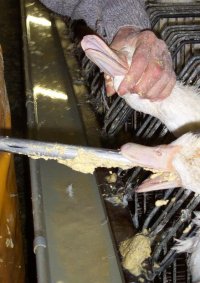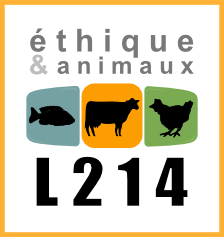Manifesto
A barbaric custom
Foie gras (literally 'fat liver') is the diseased liver of a goose or duck which has been force fed several times a day by means of a metal tube, 20 - 30 centimetres long, being thrust down his throat till it reaches the stomach. To force his body to produce foie gras, the bird must ingest a huge amount of corn in a few seconds. This results in the liver becoming almost ten times larger than its normal size, and the bird develops an illness, hepatic steatosis.

If the bird struggles when the tube is thrust down his throat, or if his oesophagus contracts with the urge to vomit, he runs the risk of suffocation and fatal perforation of the neck.
Insertion of the tube causes lesions which become germ-infested and painfully inflamed. The unbalanced and forced over-feeding frequently causes potentially fatal diseases of the digestive system.
Immediately after each force-feeding session the bird suffers from breathlessness and diarrhea. The enlargement of the liver makes it difficult to breathe, and all movement is painful.
If this treatment were to be continued, it would cause the death of the force-fed animals. They are slaughtered before they die from its consequences. However, the weakest animals are dying when they arrive in the slaughter room, and many don't last that long : the mortality rate of ducks is ten to twenty times greater than usual during the force-feeding period.
Concentrated suffering
The inherent violence of foie gras production would alone justify its abolition. However, for most of these animals their ordeal is not limited to the brutality of force-feeding. Many are amputated of part of their beak, without anaesthetic, by pliers or scissors.
It is natural for ducks to spend a large part of their life on the water. In these 'farms', many birds are kept in sheds, then in cages where their feet are injured by the wire floor. The cages are so small that the birds cannot even turn around, much less stand up or flap their wings. Many of those who survive until slaughter have their bones broken during transport and handling, and then by being hung upside down to be electrocuted prior to having their throats cut. Female ducks are usually ground up alive or gassed shortly after hatching, because their livers have more veins than those of males.
Pleasure for some, suffering for others
How can the simple pleasure of eating his liver justify imposing such a horrible life on a sentient being who, just like us, feels pain and distress ? Just because he belongs to another species, does that give us the right to remain deaf to his suffering, and silent in the face of this immoral slavery ?
There are laws to protect animals against torture and cruelty. These laws are being deliberately ignored in the case of the 30 million animals used each year for foie gras, mainly in France. We are told that "necessary suffering" is acceptable. However, consumption of this product is totally unnecessary. Nobody, not even those who make a profit from this trade, would dare assert the contrary.
The price per kilo of foie gras keeps going down for the consumer, while the animals, whose bodies are deliberately made to suffer, pay dearly.
France is also paying dearly for foie gras, as it is seen as a reactionary nation compared with those countries which have banned its production. How on earth can you say that a barbaric custom, consisting of sticking a funnel or a pneumatic pump down the throat of a caged animal, is a tradition of high culture ?
Banning foie gras : towards a food production ethic
Recognizing that foie gras production is based on a total disregard for the interests of the animal used to produce it :
- We ask those who force-feed geese and ducks to stop carrying out this abusive practice. The fact that they do not intend to be cruel to these animals does not reduce the suffering they cause.
- We ask those who profit from foie gras, without any ethical consideration, to cease their participation in this sick business.
- We ask scientific and veterinary authorities who are genuinely concerned by animal well-being to have the courage, despite political and economic pressure, to denounce foie gras production methods for what they are.
- We ask our judges to remember that there are laws limiting the suffering that can be inflicted on a sentient being, and that consequently the production of foie gras is illegal.
- We ask our politicians to legislate to ban this practice forever.
As consumers who are determined to put ethics on our dinner plates, and aware that this suffering exists solely to please our taste buds, we refuse to buy and to consume these sick livers of tortured animals.

